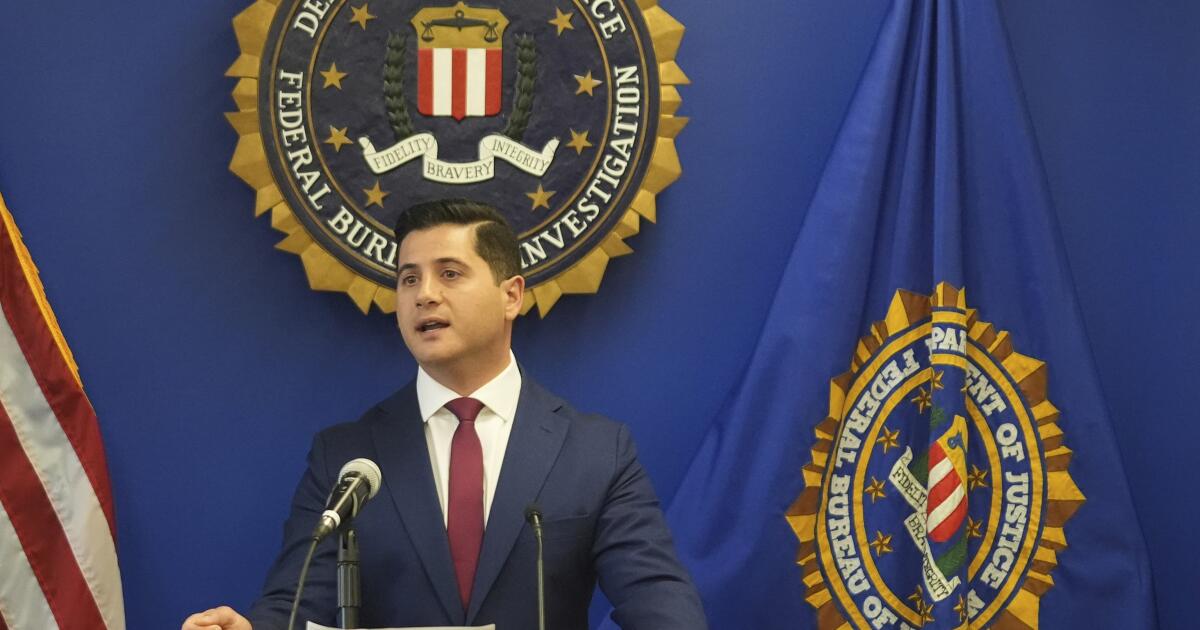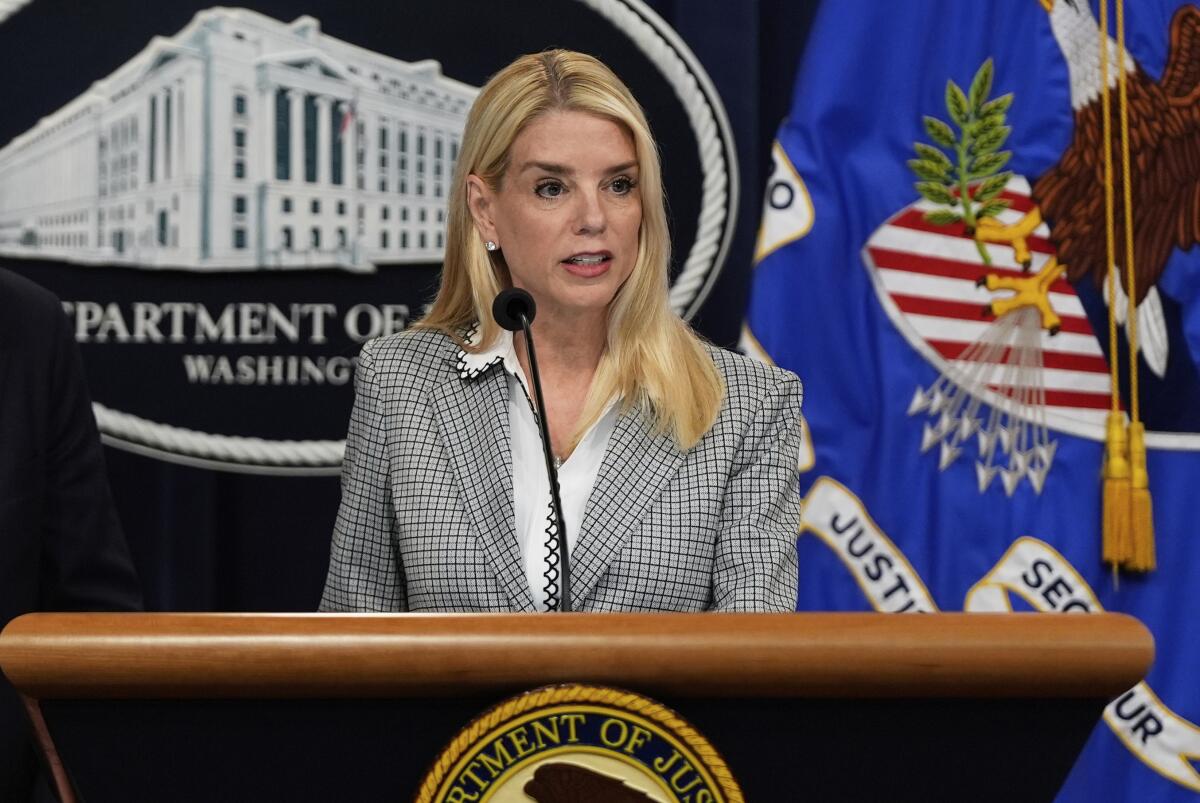Trump administration maneuvers to keep Essayli as L.A.’s U.S. Attorney
The White House moved Tuesday to keep interim U.S. Atty. Bill Essayli in power as Los Angeles’ top federal prosecutor, marking the Trump administration’s latest maneuver to defy norms and keep controversial appointees in positions across the country.
Essayli — a former Riverside County assemblyman, staunch conservative and Trump ally — will be named Acting U.S. Attorney for the Central District of California, according to Matthew Nies, a spokesman for the U.S. Department of Justice. He will be granted the acting title at 5:01 p.m., Nies said.
The maneuver — which echoes steps the Trump administration took to keep its chosen prosecutors in power in New York, New Jersey and Nevada in recent weeks — allows Essayli to stay in office while sidestepping normal confirmation processes in the U.S. Senate.
Essayli was appointed to his post by U.S. Atty. Gen. Pam Bondi in early April. Interim appointees must be confirmed by the U.S. Senate within 120 days. But Trump never moved to formally nominate Essayli for confirmation by the U.S. Senate, where he would have faced fierce opposition from California Sens. Alex Padilla and Adam Schiff, both Democrats.
That left Essayli’s fate in the hands of a local federal judicial panel, which declined to name anyone to the post on Tuesday, according to a report from Fox News. Court records do not reflect any action taken by local judges.
Assuming the role of acting U.S. attorney will seemingly give Essayli another 210 days in the position before he has to face any formal confirmation process.
A spokesman for the U.S. attorney’s office in Los Angeles referred all questions to the White House, which did not immediately respond to an inquiry. Essayli did not respond to a call seeking comment.
The move is the latest sign of the Trump administration’s willingness to use legal workarounds to keep its appointees for U.S. attorney in power as the clock runs out on their interim status.
In upstate New York, a judicial panel declined to name John A. Sarcone III, or anyone else, as U.S. attorney for the Northern District of New York. In response, Bondi appointed Sarcone to a lower position in the office but effectively gave him the powers of the top federal prosecutor.
In a letter to the chief U.S. district judge, later posted by the court, Sarcone said he’d been designated the first assistant United States attorney for the Northern District of New York and is now serving as the acting U.S. attorney for the district “indefinitely.”
In New Jersey, a judicial panel rejected Trump’s pick, Alina Habba, one of the president’s former personal attorneys who had no experience as a prosecutor before being named the state’s top federal law enforcement official. In response, the Trump administration moved to fire Desiree Leigh Grace, a career prosecutor and registered Republican whom the judicial panel named to replace Habba.
Trump later rescinded his nomination of Habba and appointed her as acting U.S. attorney. Experts have called both situations legally dubious and defense lawyers have argued the appointment violates federal statute prohibiting people whose nominations have been submitted to the Senate from serving in an acting role.
Habba’s appointment has reportedly halted federal court hearings, grand jury proceedings and plea deals in New Jersey federal courts due to questions over her authority to serve as acting U.S. attorney.
On Tuesday morning, Bloomberg Law reported that Trump used a similar move to keep Sigal Chattah as Nevada’s top federal prosecutor. Her interim term was also set to expire Tuesday.
Laurie Levenson, a former federal prosecutor in L.A. who now serves as a professor at the Loyola Law School of Los Angeles, said the Trump administration’s actions reflected an unprecedented exploitation of a legal loophole.
“These laws have never been used, as far as I can see, to bypass the Senate confirmation process or the judicial one,” Levenson said. “The most serious consequences are if you’re going to end up with indictments that are not valid because they weren’t signed by a lawful U.S. Attorney.”
It remains unclear exactly what happens when the clock on Essayli’s acting tenure runs out next year.
Essayli’s time as L.A.’s top federal prosecutor has been marked by controversy.
Not long after getting the job, he moved to offer a no-jail plea deal to L.A. County sheriff’s Deputy Trevor Kirk — who had already been convicted of assault for using excessive force when he threw a woman to the ground and pepper-sprayed her while responding to a 2023 robbery in a Lancaster supermarket. The woman was not armed or committing a crime when Kirk confronted her, court records show.
Essayli’s decision, which was not prompted by new evidence regarding Kirk’s guilt or innocence, led several veteran prosecutors to resign.
Prosecutors who spoke to The Times on condition of anonymity for fear of retaliation within the office have described Essayli as a chaotic and belligerent leader who seems more focused on advancing the president’s agenda than making decisions that comport with the law.
While Essayli has taken a hard line against demonstrators who allegedly broke the law during massive June protests against the Trump administration’s immigration raids in Southern California, a Times investigation shows he’s struggling to prove those cases in court.
Multiple federal law enforcement sources told The Times that a number of protest-related cases pushed by Essayli have failed to even secure grand jury indictments, where prosecutors face a significantly lower burden of proof than at a jury trial. Of the nearly 40 cases related to demonstrations or alleged interference with immigration raids that Essayli has filed, just seven have netted indictments, records show.
In one explosive moment, sources told The Times that Essayli screamed at prosecutors to disregard Department of Justice rules on bringing cases with weak evidence, insisting they must secure indictments for Bondi.
The U.S. attorney’s office dismissed The Times’ article, claiming it was based on “factual inaccuracies and anonymous gossip.” The statement offered no specifics about disputed facts and Bloomberg Law reported the same anecdote this week.
With Essayli’s fate now squarely in Trump’s hands, Levenson said it’s clear the White House is calling the shots for federal law enforcement in Southern California.
“I don’t think [Essayli] even pretends he’s making these decisions on his own,” Levenson said of Essayli. “I think he’s just the messenger here.”
Queally and Mejia reported from Los Angeles. Wilner reported from Washington, D.C. Times Staff Writer Seema Mehta in Los Angeles contributed to this report.


